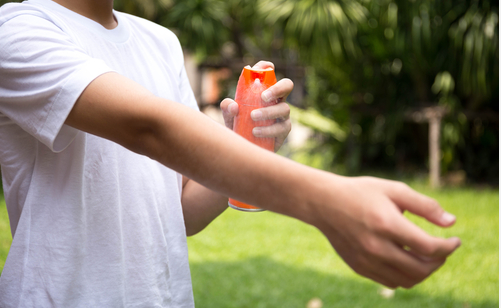Protecting yourself from mosquitoes and tick-borne diseases is critical in keeping your family healthy and happy. A great way to ward off pests that carry diseases is to use insect repellent. But if you aren’t applying it properly, it won’t work as effectively as it should. Did you know that you’re probably doing it wrong?!
Best Components of Bug Spray
Before buying, you should be educated on the ingredients your insect repellent contains:
- 20%-30% DEET (N,N-diethyl-3-methylbenzamide). The higher the concentration, the longer the product will last before reapplication is needed. The American Academy of Pediatrics recommends the use of DEET (up to 30% concentration) for anyone over the age of 2 months.
- 20% Picaridin. This odorless repellent is also approved for people over the age of 2 months.
- 30% Lemon Eucalyptus. A natural repellent, eucalyptus should not be used on people younger than three years old. May cause skin irritation when highly concentrated.
- 20% IR3535
- CDC Approved. Make sure that your spray is approved by the Centers for Disease Control. Many “natural” insect repellents are available but you can’t know if they are effective unless the CDC recommends them.
See Also: Mosquito Prevention Checklist: What You Need to Know
Application Tips for Bug Spray
Some people may be concerned about the chemical contained in many bug sprays—but the danger of being bitten by a Lyme-disease carrying tick or a West-Nile-Virus carrying mosquito is much worse. If you use insect repellent appropriately then it will be safe. Follow these guidelines to make sure you are applying insect repellent safely and appropriately:
Read the Directions.
Just because you have applied bug spray before in your life doesn’t mean you don’t need a refresher course. Sprays contain different active ingredients and their warnings vary. Read the label prior to use so that you’re clear on the basics.
Apply Thoroughly.
Shake first and hold the bottle between six and eight inches away from your body. Using a slow, sweeping motion helps you make sure that you have completely covered your entire body and clothing. Don’t spray underneath clothing.
After applying spray, you may need to use your hands to get the repellent evenly applied to exposed skin. Pay special attention to areas that might be forgotten, such as ankles, knees and elbows. Cuffs, sleeve openings, socks, and other openings should be sprayed to protect from chiggers and ticks that make their way inside clothing.
Don’t Compete with Sunscreen.
Put your sunscreen on first, then follow it with insect repellent as recommended by the U.S. Center for Disease Control and Prevention. If the sunscreen goes on after bug spray, it can reduce the efficacy of the spray. Also, try to use sunscreen that is as fragrance free as possible to keep the scent from attracting mosquitoes.
Avoid Sensitive Areas.
Broken skin, cuts, wounds, sunburn, or skin that is irritated in any other way should be avoided when applying insect repellent. Also avoid eyes, mouth and nose. To apply insect repellent to your face, spray on your hand first and then gently apply to the face and around your ears. Wash hands thoroughly afterwards.
Be Careful with Children.
For children, apply insect repellent for them and don’t spray it directly onto their skin—spray on your hands first and then apply. Insect repellent should never be used on children under the age of two months. Pregnant and nursing women should reduce the amount of insect repellent used when possible.
See Also: 5 Facts You Didn’t Know About Mosquitoes
Apply Outdoors.
Any kind of insect repellent contains chemicals that keep you safe but also should avoid being ingested. Spraying outdoors allows the chemicals to dissipate into the air so that you and your family are not breathing them in.
Pay Attention.
Reapply when necessary—but not too often. If you start noticing bites or swarms near you, reapply. After coming indoors, wash skin that has contain repellents and launder all clothing to which repellent has been applied. If an allergic reaction appears after use, wash off right away and contact a medical professional.
Wearing insect repellent can be effective in keeping you protected from pesky bites as well as a variety of diseases. That is, if it is properly applied. To protect your family thoroughly, consider Cypress Creek for all of your Houston Pest Control concerns.



